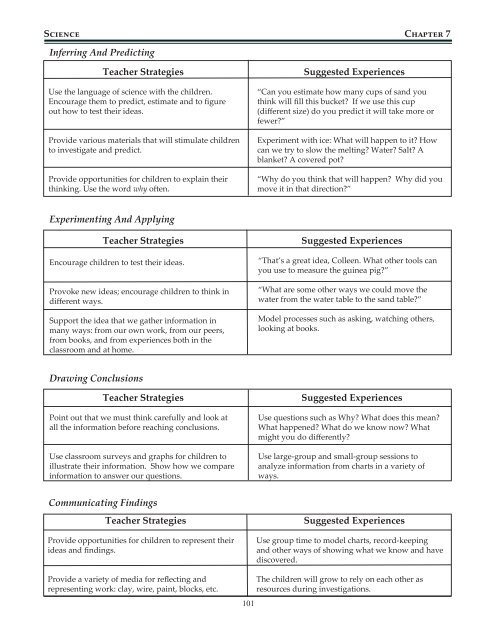Early Childhood
Early Childhood
Early Childhood
Create successful ePaper yourself
Turn your PDF publications into a flip-book with our unique Google optimized e-Paper software.
Science Chapter 7<br />
Inferring And Predicting<br />
Teacher Strategies<br />
Use the language of science with the children.<br />
Encourage them to predict, estimate and to figure<br />
out how to test their ideas.<br />
Provide various materials that will stimulate children<br />
to investigate and predict.<br />
Provide opportunities for children to explain their<br />
thinking. Use the word why often.<br />
Experimenting And Applying<br />
Teacher Strategies<br />
Encourage children to test their ideas.<br />
Provoke new ideas; encourage children to think in<br />
different ways.<br />
Support the idea that we gather information in<br />
many ways: from our own work, from our peers,<br />
from books, and from experiences both in the<br />
classroom and at home.<br />
Drawing Conclusions<br />
Teacher Strategies<br />
Point out that we must think carefully and look at<br />
all the information before reaching conclusions.<br />
Use classroom surveys and graphs for children to<br />
illustrate their information. Show how we compare<br />
information to answer our questions.<br />
Communicating Findings<br />
Teacher Strategies<br />
Provide opportunities for children to represent their<br />
ideas and findings.<br />
Provide a variety of media for reflecting and<br />
representing work: clay, wire, paint, blocks, etc.<br />
101<br />
Suggested Experiences<br />
“Can you estimate how many cups of sand you<br />
think will fill this bucket? If we use this cup<br />
(different size) do you predict it will take more or<br />
fewer?”<br />
Experiment with ice: What will happen to it? How<br />
can we try to slow the melting? Water? Salt? A<br />
blanket? A covered pot?<br />
“Why do you think that will happen? Why did you<br />
move it in that direction?”<br />
Suggested Experiences<br />
“That’s a great idea, Colleen. What other tools can<br />
you use to measure the guinea pig?”<br />
“What are some other ways we could move the<br />
water from the water table to the sand table?”<br />
Model processes such as asking, watching others,<br />
looking at books.<br />
Suggested Experiences<br />
Use questions such as Why? What does this mean?<br />
What happened? What do we know now? What<br />
might you do differently?<br />
Use large-group and small-group sessions to<br />
analyze information from charts in a variety of<br />
ways.<br />
Suggested Experiences<br />
Use group time to model charts, record-keeping<br />
and other ways of showing what we know and have<br />
discovered.<br />
The children will grow to rely on each other as<br />
resources during investigations.


